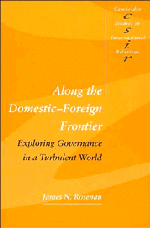Book contents
- Frontmatter
- Contents
- List of figures and tables
- Preface
- Acknowledgments
- Part I Intellectual contexts
- Part II Global contexts
- 4 Turbulence
- 5 Globalization
- 6 Fragmegration
- 7 Boundaries
- 8 Governance
- 9 Norms
- 10 Environments
- Part III Societal contexts
- Part IV Actors
- Part V Conclusions
- Epilogue
- Index
- CAMBRIDGE STUDIES IN INTERNATIONAL RELATIONS
5 - Globalization
Published online by Cambridge University Press: 19 January 2010
- Frontmatter
- Contents
- List of figures and tables
- Preface
- Acknowledgments
- Part I Intellectual contexts
- Part II Global contexts
- 4 Turbulence
- 5 Globalization
- 6 Fragmegration
- 7 Boundaries
- 8 Governance
- 9 Norms
- 10 Environments
- Part III Societal contexts
- Part IV Actors
- Part V Conclusions
- Epilogue
- Index
- CAMBRIDGE STUDIES IN INTERNATIONAL RELATIONS
Summary
Everyone feels their life is determined by someone outside, and everyone wants to know who is this person? Who is this force? We thought that we were on the path to the first world and suddenly something went wrong. One minute the World Bank and IMF were saying Mexico was the best example. Now we are the worst example. What did we do? We are losing control. If we don't find another type of development, we are finished. We surrender.
Enrique del Val BlancoIn the 19th century people thought the machine was going to destroy their lives as they knew it, and today many people think that globalization is going to destroy their life as they know it. We have gotten accustomed to the idea that globalization will inevitably succeed. But I am not so sure anymore. Those of us who believe in globalization need to be more pro-active.
Klaus SchwabAs indicated by the enumeration of the dynamics driving turbulence on a global scale, it has become commonplace to stress the large degree to which powerful communications and transportation technologies are rendering the world ever more interdependent and the boundaries that divide local, national, and international communities ever more porous. Today a development in any part of the world can have consequences for every other part. What is distant is also proximate, paradoxical as that may seem.
- Type
- Chapter
- Information
- Along the Domestic-Foreign FrontierExploring Governance in a Turbulent World, pp. 78 - 98Publisher: Cambridge University PressPrint publication year: 1997



